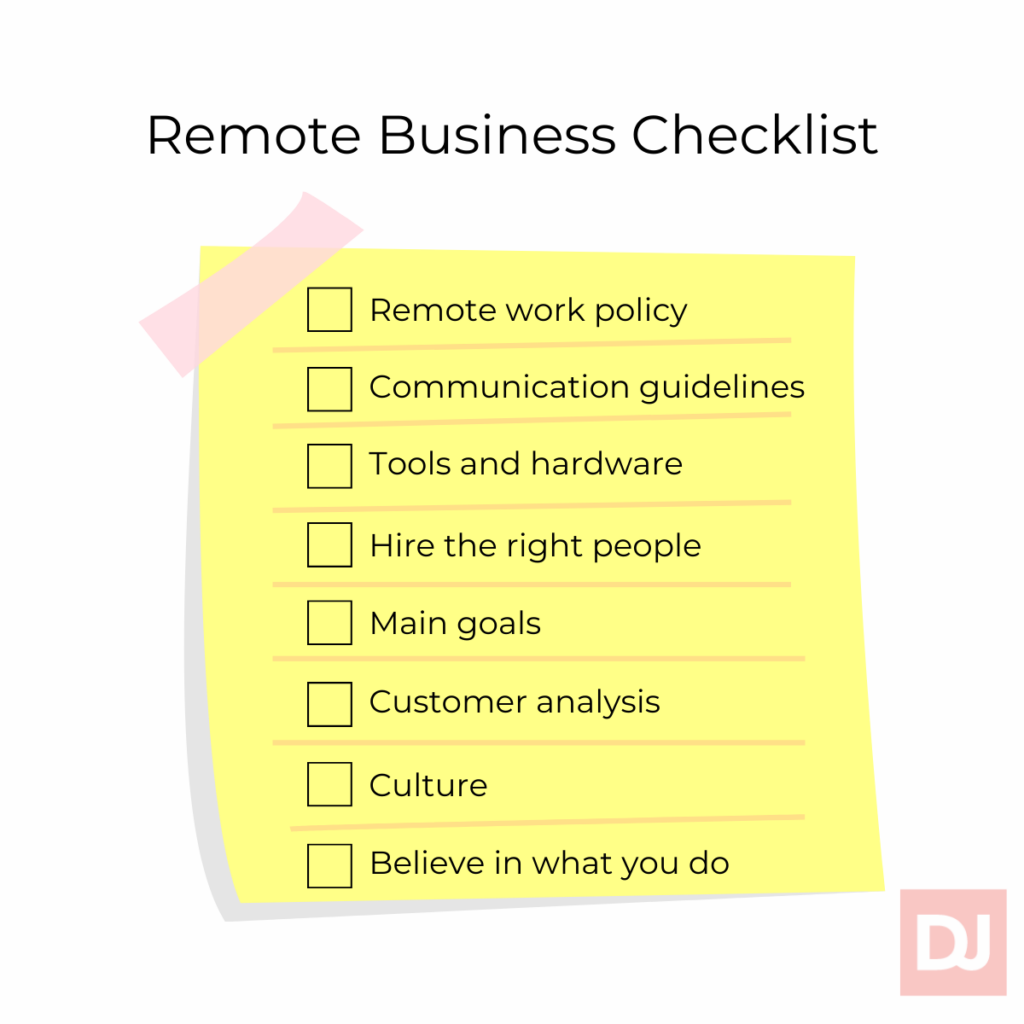2020 is the year that changed everything. Companies realized that they could work without having to be at an office micromanaging their teams. And because of the vast number of companies that made the transition to remote work and had successful results, many entrepreneurs have the vision to build a fully remote startup with teams spread all over the world. Although results can be successful, and many benefits come along, running a virtual business is not a piece of cake. It requires a lot of organization, passion, and vision. In this article, you’ll find actionable tips to start a remote small business successfully.
How to Plan a Remote Business Checklist
The key to all businesses (not only remote) besides passion is organization. You cannot be successful if you don’t have the basic set-up aspects of your company. If you are wondering how to start a remote company, here is the checklist with 8 actionable tips:

1. Build a Remote Work Policy
Usually, remote work policies refer to companies that are either hybrid or have a few remote employees. In the policy, companies outline when and how employees can work from locations outside the office.
Yet, if you are planning to build a fully remote startup, your policy should outline the basic principles and aspects you think all employees need to understand.
Aspects such as:
- How will remote employees be paid?
- What tools/hardware will remote employees need?
- Is the company giving a monthly budget for these tools?
- How are the time zones going to be managed?
- Do all employees need to be connected during certain hours?
- How will employees secure the work platforms they use?
- How often will meetings take place? Daily or weekly?
- Should employees always use cameras during meetings?
- What are the legal rights and responsibilities all employees have?
2. Write the Communication Guidelines
Every remote business owner will tell you to prioritize communication. Without having clear communication guidelines, your startup is destined to fail. It sounds tragic, but it’s the truth. Communication is the foundation for distributed teams. Humans don’t have the superpower to read each other’s minds, so don’t expect employees to guess what you are thinking or what you imply. It’s better to over communicate and make sure that the ground rules are understood – mainly because this will set the foundation of how employees are expected to communicate with their leaders and teams.
If you establish the right communication strategies and channels from the beginning, it will be much easier for everyone to do their job efficiently.
If you are wondering how to build great communication guidelines, Sharon Koifman, DistantJob’s President and Founder, wrote a template for all company owners to use as a guide.
3. Define the Tools You’ll Use
When working remotely, technology becomes your soul. Without it, it’s impossible to make things happen. Thankfully with the significant growth of remote workers, there are now thousands of tools in the market.
When planning and setting your remote startup, make sure you have the right communication tools. What tools will your company be using to communicate? Keep in mind that you can’t use the same tool for everything because 1) you will be working with people with different time zones, and 2) Is not productive for anyone.
You’ll need to define which tools are the best for video conferencing, which tools are the best for quick reminders or small talk, and which tools are the best for saving documentation.
Secondly, define what project management tool you’ll be using. Old are the days when we used paper; now everything is digital! There are many project management software such as Asana, Basecamp, and Trello to help teams to organize efficiently. Each team sets its own pace, knows what they are working on, and keeps everything documented. Also, managers can establish due dates and keep track of how things are moving without asking employees.
Other tools to keep in mind are regarding cloud storage and security.
4. Hire the Right People
Building a successful startup is mainly about the people you have by your side. Often managers think they can do everything by themselves because sadly they don’t trust that their employees are capable enough. And this mistake happens when managers hire the wrong people! When you make good interviews, ask the right questions, and seek also for the soft skills you’ll be able to hire the right people to make a solid team.
Also, keep in mind that the candidates you hire need to be experts in areas you don’t manage well. That’s the whole point of teams – each member has its own strength. As a leader, your job is to guide your employees with the company’s goals and inspire each member of the team to give their best.
5. Know What Your Goals Are
If you don’t know where you want to go, it’s easy to lose all the motivation. Why are you starting this startup? What is your main goal?
Goals are the foundation of startups, and specifically, of successful businesses. Let’s take as an example, Apple. The big tech company started at the garage of Steve Job’s parents. How did they go from having this small uncomfortable working space to having thousands of fancy buildings worldwide? Because Steve Jobs knew exactly what his goal was. He was determined to challenge the status quo and transform the way people use technology.
If you don’t know your goals, it doesn’t matter if you have a kick-ass team and the best tools. It doesn’t matter the effort you put into starting your business because it’s easier to lose motivation after a while. Without goals, there will never be results.
6. Know Your Customer
Imagine you want to start a shoe business. You can’t just design and produce shoes and then throw yourself into the market to see who will magically appear and buy your shoes. You need to build an effective plan and analyze what type of audience will be interested in the shoes you’ll be producing. Ask yourself:
- Who is likely to buy this product/service?
- How can this audience get to know my startup? (By social media, banners, etc)
- How can I engage possible prospects effectively?
When you know your customer, it’s easier to make a business plan and begin developing your strategies.
7. Build the Right Culture
Culture is one of the most clichés topics found in most business administration books. There are extensive guides to show you how to create and foster a healthy culture for your company. But this topic overall is subjective and has many definitions. For some people, culture means having a strict guide of the company’s values and goals. For others, culture has a more profound meaning.
In this video, Sharon Koifman gives his insight into the meaning of culture:
However, one thing is for sure. Culture matters because it makes employees feel valued and part of the team. This is especially relevant in remote environments where employees often feel left out or lonely because they are not working with people in the same space. When actually, it doesn’t matter if you don’t have your coworkers beside you because there are so many ways you can have fun and connect with your team members virtually.
8. Believe in Your Startup
“Chase the vision not the money, the money will end up following you” – Tony Hsieh
Money is essential, and it’s what makes us want to invest, work, build, and create most of the time. But if you decide to build a startup because you just want to be rich, it’s easier to give up when things are not looking good. The main reason is that startups take a lot of time and effort, and money comes after all that.
If you genuinely believe in the power of your startup, your motivation will be permanent. You’ll know that you’ll have to sacrifice a lot of your time, but it will all be worth it. And most importantly, you’ll build a culture where everyone working with you will have the same belief and work towards the same goals.
Want to Build a Successful Remote Business?
Times are tough, and we know many entrepreneurs and small businesses are having a hard time. At DistantJob we’ve been sailing in the remote waters for more than a decade, we know all about managing remote teams. This is why we are offering a remote leadership masterclass with our VP of operations, Rustam Ahverdiev! And the best part? It’s completely free! Book now and don’t miss this incredible opportunity.



